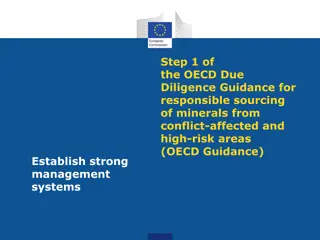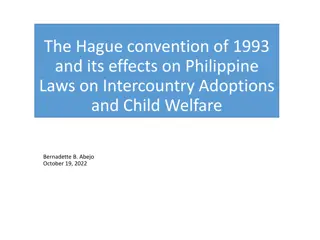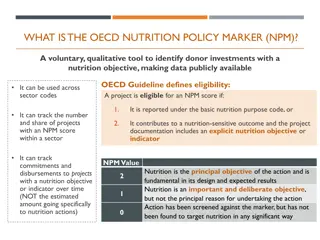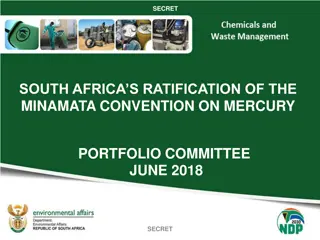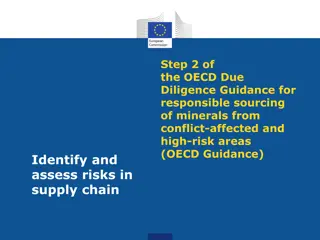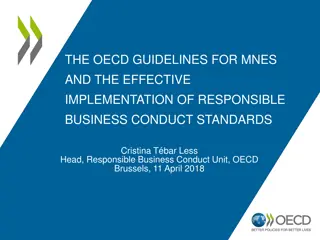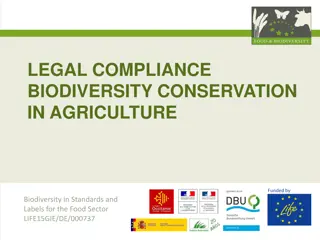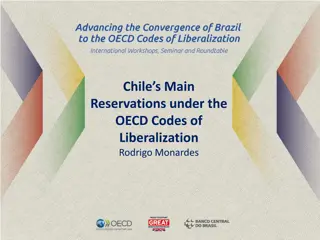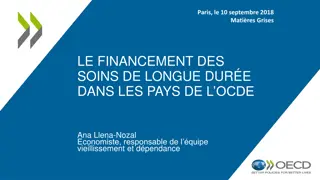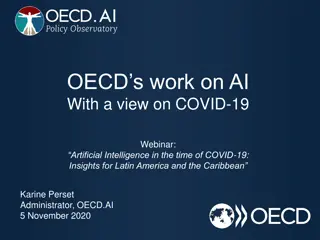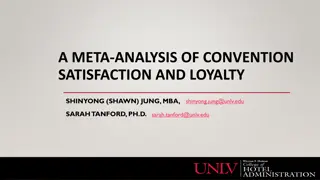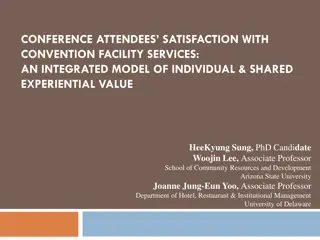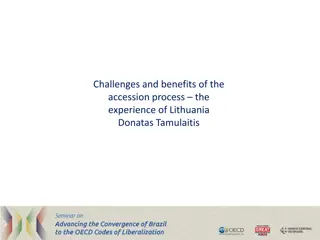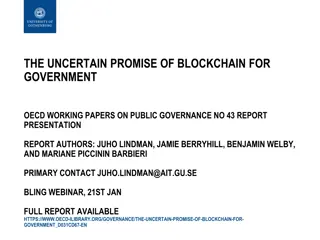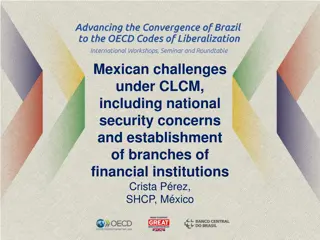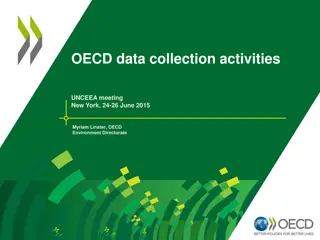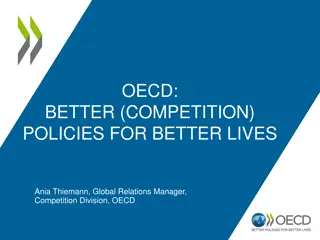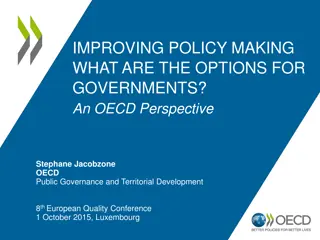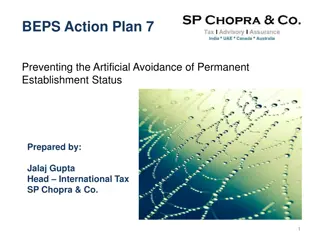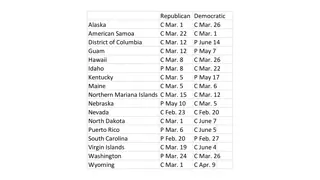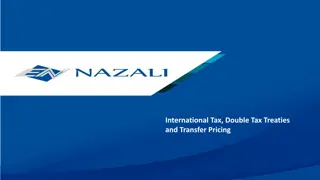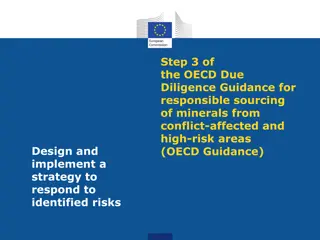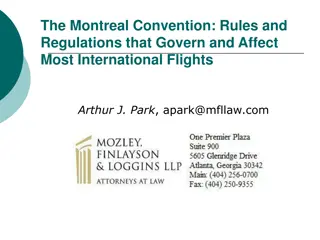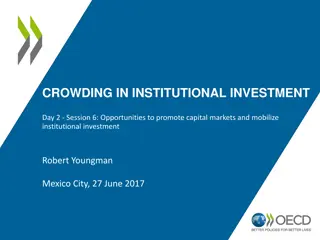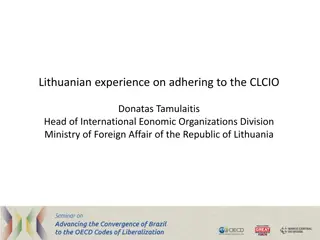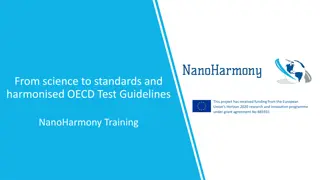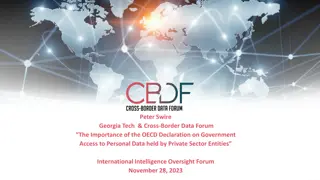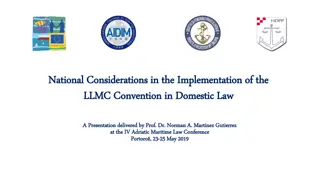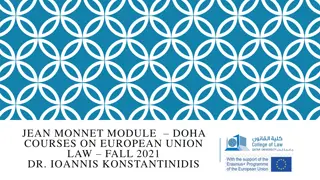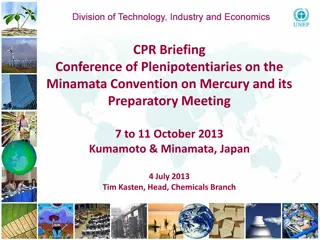Achieving Effective Delivery of Infrastructure Projects: Insights from OECD Seminar
Infrastructure investments play a crucial role in global development, but their successful delivery is becoming increasingly complex. Issues such as governance, ownership, and policy responsiveness can impact project outcomes. Without strategic management, projects may face challenges like inadequat
0 views • 24 slides
Proposed Ratification of the 2003 Convention on Safeguarding Intangible Cultural Heritage
The briefing presents a proposal for the ratification of the 2003 UNESCO Convention on Safeguarding Intangible Cultural Heritage (ICH). The Convention aims to safeguard, preserve, and promote ICH, which includes practices, knowledge, skills, and cultural spaces passed down through generations. It em
0 views • 19 slides
SUSTAINABLE WATER USE FOR GREEN HYDROGEN PRODUCTION: PRELIMINARY INSIGHTS FROM OECD WORK IN MONGOLIA
Preliminary insights from OECD work in Mongolia discuss the impact of green hydrogen production on water, sustainable approaches, and possible ways forward. The Sustainable Infrastructure Programme in Asia supports the transition towards net-zero infrastructure with a focus on enabling policies, pla
0 views • 14 slides
Challenges and Progress in Chilean Infrastructure Development
The challenges of Public-Private Partnerships (PPPs) in Chile within the framework of best practices and international standards are discussed, highlighting the need for long-term infrastructure planning and enhanced governance. The 2017 OECD Infrastructure Governance Review identified deficiencies
4 views • 40 slides
Challenges and Opportunities in Monitoring and Evaluation in OECD Countries
Monitoring and evaluation in OECD countries present unique challenges and opportunities, requiring clear mandates, ongoing processes, and robust institutional frameworks. The OECD approach emphasizes fostering quality, ensuring impact, and sharing lessons learned for efficient resource management. I
2 views • 12 slides
Amended Convention on Physical Protection of Nuclear Material Tabling in Parliament
The Amended Convention on Physical Protection of Nuclear Material (CPPNM) is being tabled for acceptance and ratification in Parliament on 05 September 2023. The purpose is to enhance physical protection measures for nuclear material, especially in the face of increased security concerns post the 9/
3 views • 18 slides
OECD Due Diligence Guidance: Establish Strong Management Systems
The OECD Due Diligence Guidance outlines the importance of establishing strong management systems for responsible sourcing of minerals from conflict-affected and high-risk areas. This involves adopting company policies, engaging with suppliers, implementing grievance mechanisms, and utilizing the 3P
0 views • 13 slides
The Hague Convention of 1993 and Its Impact on Philippine Laws on Intercountry Adoptions and Child Welfare
The Hague Convention of 1993 plays a significant role in shaping Philippine laws regarding intercountry adoptions and child welfare. This convention emphasizes principles like the best interests of the child, subsidiarity principle, and prohibition of improper gain. It guides policies and legislatio
0 views • 10 slides
Understanding the OECD Nutrition Policy Marker (NPM)
The OECD Nutrition Policy Marker (NPM) is a voluntary tool to identify donor investments with a nutrition objective. It helps mainstream nutrition in large-scale programs to improve outcomes and accountability. The NPM is applied at the project level to track investments and promote transparency in
1 views • 4 slides
South Africa's Ratification of the Minamata Convention on Mercury
South Africa is seeking Parliament's approval to ratify the Minamata Convention on Mercury, which aims to reduce mercury emissions globally. Mercury, a toxic heavy metal, poses significant health and environmental risks through various human and natural activities. The Convention offers financial an
0 views • 13 slides
Responsible Sourcing in Conflict-Affected Areas: OECD Guidelines
The OECD Due Diligence Guidance outlines steps for companies to identify and assess risks in mineral supply chains from conflict-affected and high-risk areas. It explains Conflict-Affected and High-Risk Areas (CAHRAs) and the importance of due diligence in responsible mineral sourcing to avoid finan
4 views • 16 slides
OECD Guidelines for Responsible Business Conduct
The OECD Guidelines for Multinational Enterprises provide a framework for responsible business conduct, encouraging sustainable practices and minimizing negative impacts. The OECD's work on responsible business conduct focuses on enhancing economic and social well-being globally, emphasizing ethical
1 views • 30 slides
Legal Compliance for Biodiversity Conservation in Agriculture
International conventions play a key role in setting norms and standards for biodiversity conservation in agriculture. The Convention on Biological Diversity, Rio Convention, Ramsar Convention, and others are vital agreements shaping policies around biodiversity. The focus is on conserving biologica
0 views • 22 slides
Chile's Financial Services Liberalization Overview
This content provides an in-depth look at Chile's main reservations under the OECD Codes of Liberalization, including its context of accession to OECD Free Trade Agreements and commitments to liberalization in services, investments, and financial services. It covers aspects such as cross-border trad
5 views • 20 slides
OECD Expert Group on Disparities in National Accounts Work Summary
The OECD Expert Group on Disparities in National Accounts focuses on developing methodology to produce distributional results for household income, consumption, and saving. Their work involves adjusting national accounts totals, identifying relevant variables from micro data sources, imputing missin
0 views • 15 slides
Financing Long-Term Care in OECD Countries: Insights and Challenges
The funding of long-term care services in OECD countries poses significant financial and organizational challenges, with a growing proportion of the elderly population requiring such services. This article delves into the financing mechanisms, the public funding landscape, and potential reform pathw
0 views • 10 slides
History and Achievements of AAUW-IL State Convention
Marion Talbot and Ellen Swallow Richards founded the American Collegiate Association, later evolving into the American Association of University Women (AAUW). The AAUW-IL State Convention, held annually, celebrates empowering women for over a century. The convention has a rich history, including sig
0 views • 13 slides
OECD's Work on AI in Response to COVID-19: Insights for Latin America and the Caribbean
OECD is focusing on AI in the context of COVID-19, emphasizing the importance of trustworthy AI for societal benefits. The organization has outlined principles for implementing AI in policies, with a goal of fostering an ecosystem that prioritizes human rights, transparency, accountability, and more
0 views • 18 slides
Meta-Analysis of Convention Satisfaction and Loyalty Trends
This meta-analysis explores the relationship between attributes, perceptions, satisfaction, and loyalty in the convention industry. It highlights key findings from multiple studies using statistical methods to analyze attendee satisfaction and loyalty factors. The study emphasizes the importance of
0 views • 11 slides
Understanding Convention Attendees' Satisfaction with Facility Services
This study explores the relationship between service quality, experiential value, and satisfaction of convention attendees at a facility. It delves into individual experiential values and their impact on perceived service quality, aiming to provide insights into enhancing the overall convention expe
0 views • 12 slides
Challenges and Benefits of OECD Accession Process: Experience of Lithuania
The experience of Lithuania in the OECD accession process involves various objectives like national investment regime improvement, safeguarding measures, and coordination efforts with different ministries. Reservations and challenges in areas such as direct investment, real estate operations, and ba
0 views • 8 slides
The Uncertain Promise of Blockchain for Government - OECD Working Paper
This OECD working paper explores the potential impact of blockchain on government operations. Authored by Juho Lindman, Jamie Berryhill, Benjamin Welby, and Mariane Piccinin Barbieri, the report delves into the opportunities and challenges presented by blockchain technology in public governance. Juh
0 views • 19 slides
Challenges Faced by Mexico Under CLCM and Establishment of Financial Institutions
Mexico faced challenges related to national security concerns and the establishment of branches of financial institutions under the Codes of Liberalisation of Capital Movements (CLCM). The country's entry into the OECD in 1994 marked a significant period of liberalization and reforms, including exte
0 views • 13 slides
OECD Data Collection Activities Overview
OECD's data collection activities include interrelated work streams focusing on environmental data and indicators, database development, green growth, sectoral statistics, and regional analysis. The organization aims to provide comprehensive information to support policy-making and promote global co
0 views • 22 slides
Wisconsin Association of Campground Owners 2019 Convention & Trade Show Details
The Wisconsin Association of Campground Owners (WACO) is hosting their 2019 Convention & Trade Show at the Holiday Inn Hotel & Convention Center in Stevens Point, WI. The event includes trade show hours, vendor appreciation dinner, programs, sponsorship opportunities, lodging details, vendor program
0 views • 4 slides
Promoting Better Lives Through OECD's Competition Policies
The OECD's Competition Division works towards promoting fairer development, better education, healthcare, pensions, and employment through its outreach programs and global forums. The Global Forum on Competition engages participants from around the world to discuss topics like fighting corruption, p
0 views • 15 slides
Enhancing Policy Making: Options for Governments - An OECD Perspective
Various tools and approaches are discussed to improve policy making, including foresight, cost-benefit analysis, and regulatory tools. The changing context of policy challenges is highlighted, along with the OECD policy toolkit's modular approach. Strategies like talking to leaders, engaging stakeho
0 views • 20 slides
Understanding BEPS Action Plan 7: Preventing Artificial Avoidance of Permanent Establishment Status
The Action 7 Report aims to prevent artificial avoidance of Permanent Establishment (PE) status by making changes to the PE definition in the OECD Model Tax Convention. BEPS refers to tax planning strategies exploiting tax rule gaps to shift profits to low-tax locations. The OECD issued 15 action pl
0 views • 10 slides
Democratic National Convention Delegate Process in South Carolina
The process of becoming a Democratic National Convention delegate in South Carolina involves voting in the presidential primary, attending precinct caucuses, county conventions, and the state convention. Delegates are elected based on candidate support, with additional unpledged and pledged delegate
0 views • 6 slides
Understanding Permanent Establishments in International Taxation
Permanent establishments play a crucial role in determining tax liabilities for companies operating across borders. In Turkish corporate taxation, limited liability taxpayers are defined by their place of business and permanent representatives. The OECD Model Convention also provides guidelines on w
0 views • 18 slides
Responding to Risks in OECD Due Diligence Guidance
Develop and implement a strategic response to identified risks in accordance with the OECD Due Diligence Guidance for responsible sourcing of minerals. The process involves reporting findings to management, devising a risk management plan, implementing the plan, and assessing ongoing risks. Mitigati
0 views • 7 slides
Understanding the Montreal Convention: Rules and Regulations for International Flights
The Montreal Convention governs international travel and limits carrier liability. It came into effect in the US in 2003, replacing the Warsaw Convention. The application of the Montreal Convention depends on the countries involved in the flight, ratification status, and agreement stopping places. T
0 views • 26 slides
Opportunities to Mobilize Institutional Investment in Capital Markets
Aligning trillions of dollars managed by OECD institutional investors towards green infrastructure investments presents a significant opportunity. Currently, only a small percentage of large pension fund assets are directed towards infrastructure, with an even smaller fraction allocated to green pro
0 views • 4 slides
Lithuanian Journey Towards OECD Accession: Key Coordination Efforts
Lithuanian's experience in adhering to the CLCIO, coordinated by Donatas Tamulaitis, focuses on various processes including OECD accession, communication with Member states, management of recommendations, and more. The journey started in 2014 with the initial list of reservations and progressed thro
0 views • 14 slides
NanoHarmony Training: Standards and OECD Guidelines Overview
Delve into the world of standards and OECD Test Guidelines with the NanoHarmony Training material. Learn about harmonized test methods, the role of science in guideline development, engagement with OECD committees, and the process of creating OECD Test Guidelines. Explore how stakeholders can contri
0 views • 16 slides
Legal Implications of Aeromexico Flight 2431 Crash under Montreal Convention
This content discusses the legal aspects surrounding the crash of Aeromexico Flight 2431 under the Montreal Convention. It covers the survivors, victims, jurisdictional issues for U.S. counsel, the Montreal Convention's scope to limit liability for international flights, and factors determining if a
0 views • 10 slides
Challenges and Importance of Government Access to Personal Data in Cross-Border Intelligence Oversight
Reflecting on the significance of the OECD Declaration on Government Access to Personal Data held by Private Sector Entities, this content delves into the drivers necessitating an OECD-type process, such as law enforcement needs, globalization of criminal evidence, and convergence of civilian commun
0 views • 8 slides
National Considerations in Implementing the LLMC Convention
This presentation by Prof. Dr. Norman A. Martinez Gutierrez discusses the international legal framework governing global limitation of liability for maritime claims, focusing on the LLMC Convention. It explores the distinction between global limitation and particular liability regimes, outlines key
0 views • 30 slides
EU Charter of Fundamental Rights and European Convention on Human Rights Overview
The course module on European Union Law in Doha focuses on the EU Charter of Fundamental Rights and its relationship with the European Convention on Human Rights. It covers topics such as the EU's accession to the Convention, external action on human rights, and the differences between the Charter a
0 views • 26 slides
Progress and Agreements on Minamata Convention on Mercury
International efforts towards addressing mercury pollution culminated in the negotiation and agreement on the Minamata Convention on Mercury. After years of deliberation, governments agreed on the need for a legally binding instrument to tackle the adverse effects of mercury on health and the enviro
0 views • 17 slides






